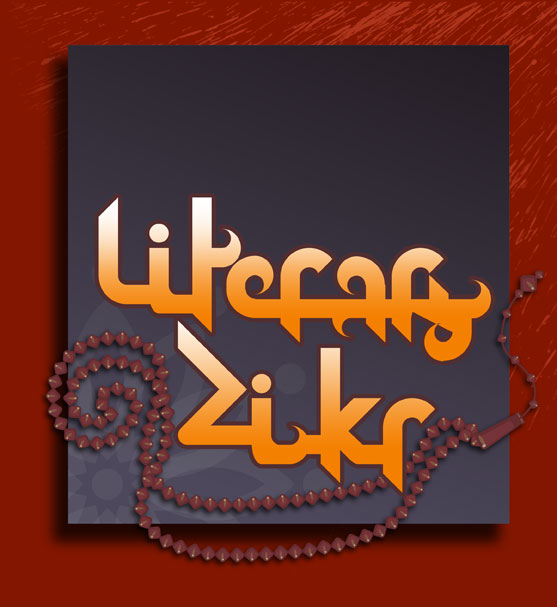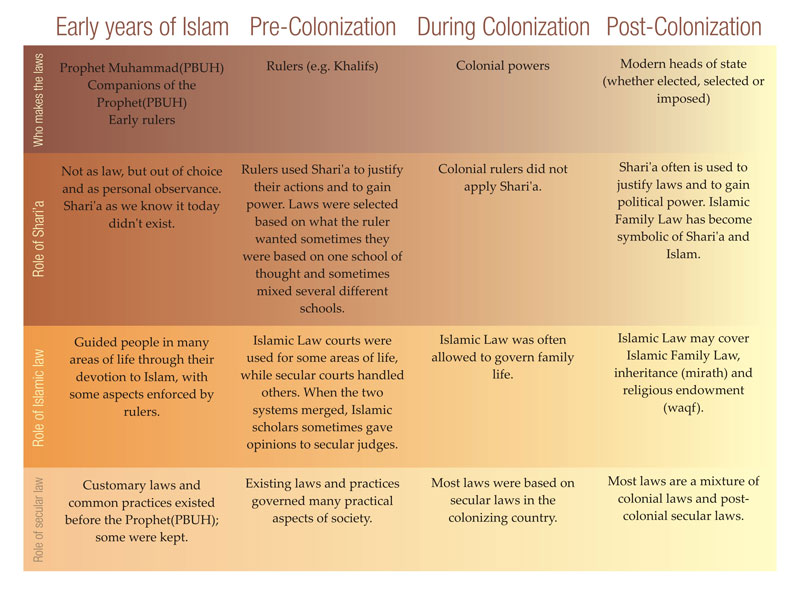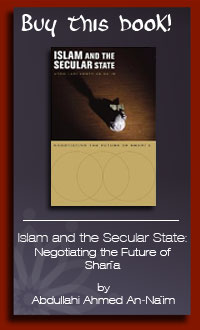





Is Islamic Family Law today really based on Shari'a?
Why it is important to know.
By Professor Abdullahi Ahmed An-Nai'm | Adapted for MPV by Tynan Power
Page: Preface | 1 | 2 | 3 | Notes
Why it is important to know.
By Professor Abdullahi Ahmed An-Nai'm | Adapted for MPV by Tynan Power
Page: Preface | 1 | 2 | 3 | Notes
Was Shari'a used as law at the time of the Prophet Muhammad(PBUH)?
No. During the life of the Prophet Muhammad(PBUH) and for 150 years after he died, the Shari'a did not exist the way we think of it today. People did not treat Shari'a as a system of laws.
Were early Islamic societies governed by Islamic Law?
No. Early Islamic societies were ruled by caliphs (from Arabic “khalifa”)—such as Al-Khulafa al-Rashidun (the "Rightly-Guided Caliphs")—and later by kings and emperors. These rulers mixed Islamic ideas with secular rules that were already in place or that had been the common practice. These early Muslim empires did not have what we now call “law”, with the government making laws that apply to all people and enforcing the laws everywhere in the same way. Communities of Muslims applied Shari’a in their own informal ways. Over time, laws changed. Some new rulers tried to bring the law closer to Islamic Law—as they understood it at the time, which might have been different from how previous rulers understood it. Others introduced new secular laws based on culture or their personal goals.
Did laws in Islamic countries change when they were colonized?
Yes. Almost all Islamic countries were controlled by European, non-Islamic countries. This was called colonization, and the Islamic countries were called colonies or protectorates of the European nations that controlled them. The European countries in power, such as Britain and France, were called colonial powers. These countries brought their own laws and practices and put them to use in the Islamic countries they controlled.
Before colonization, Shari’a was observed by Muslims, but it was not enforced by government. Colonization changed that.
Traditional application of Shari'a by communities was replaced by European-style laws that were developed so the government could enforce them.
For example, before colonization, the parties in a legal case would select the madhab (school of thought) they wanted to apply to their case. They would select a judge (qadi) who was an expert in that madhab and present their case. That way both parties gave the judge the authority to make a decision. They knew the judgment was consistent with their own beliefs, and they could accept that the decision of the judge was valid. During colonial rule, that traditional choice was no longer possible. European legal codes were created and applied by the government, according to its own authority. People didn't have a choice in the matter: they had no choice which madhab they wanted to follow or which judge they wanted to consult.
This happened in all fields of law, but it happened differently in family law. Sharia was supposed to continue to apply to family law. Even in family law matters, though, government officials selected particular principles of Shari'a to be turned into laws, based on their own preference. Sometimes the rulers mixed very different views from different scholars, turning them into rules that none of the scholars would accept as valid.
After independence, Muslim rulers continued trying to apply Shari'a as law based on the system they were used to—the colonial system. The result was an Islamic Family Law that is very similar to the European laws from the colonial time. To make these laws more acceptable to people, Islamic governments say that the family law is "Islamic."
Were there secular courts in Islamic countries before colonization?
Yes. Secular courts existed from the Umayyad period (661-750 CE) and the Abassid period (starting around 750 CE). These secular courts covered many practical issues for the nation, while Shari'a judges dealt with things they considered "religious matters," including family law. In later times, these two legal systems combined into a system in which secular judges consulted with Islamic scholars, as needed. An Islamic scholar, or mufti, could offer a religious ruling, or fatwa, based on his interpretation of Shari'a. A secular judge could then use the fatwa to make a legal ruling.
Did colonization change the legal systems in Islamic countries?
Yes, but not entirely. In the 1800s, colonial powers created secular courts, especially to deal with civil and criminal cases using colonial laws. In colonized countries, Islamic Law and existing secular laws were often replaced by these new colonial laws. In practice, Islamic Law became more limited, often reduced to the field of family law.
Read on to understand how Islamic Family Law is used today.
No. During the life of the Prophet Muhammad(PBUH) and for 150 years after he died, the Shari'a did not exist the way we think of it today. People did not treat Shari'a as a system of laws.
Were early Islamic societies governed by Islamic Law?
No. Early Islamic societies were ruled by caliphs (from Arabic “khalifa”)—such as Al-Khulafa al-Rashidun (the "Rightly-Guided Caliphs")—and later by kings and emperors. These rulers mixed Islamic ideas with secular rules that were already in place or that had been the common practice. These early Muslim empires did not have what we now call “law”, with the government making laws that apply to all people and enforcing the laws everywhere in the same way. Communities of Muslims applied Shari’a in their own informal ways. Over time, laws changed. Some new rulers tried to bring the law closer to Islamic Law—as they understood it at the time, which might have been different from how previous rulers understood it. Others introduced new secular laws based on culture or their personal goals.
Did laws in Islamic countries change when they were colonized?
Yes. Almost all Islamic countries were controlled by European, non-Islamic countries. This was called colonization, and the Islamic countries were called colonies or protectorates of the European nations that controlled them. The European countries in power, such as Britain and France, were called colonial powers. These countries brought their own laws and practices and put them to use in the Islamic countries they controlled.
Before colonization, Shari’a was observed by Muslims, but it was not enforced by government. Colonization changed that.
Traditional application of Shari'a by communities was replaced by European-style laws that were developed so the government could enforce them.
For example, before colonization, the parties in a legal case would select the madhab (school of thought) they wanted to apply to their case. They would select a judge (qadi) who was an expert in that madhab and present their case. That way both parties gave the judge the authority to make a decision. They knew the judgment was consistent with their own beliefs, and they could accept that the decision of the judge was valid. During colonial rule, that traditional choice was no longer possible. European legal codes were created and applied by the government, according to its own authority. People didn't have a choice in the matter: they had no choice which madhab they wanted to follow or which judge they wanted to consult.
This happened in all fields of law, but it happened differently in family law. Sharia was supposed to continue to apply to family law. Even in family law matters, though, government officials selected particular principles of Shari'a to be turned into laws, based on their own preference. Sometimes the rulers mixed very different views from different scholars, turning them into rules that none of the scholars would accept as valid.
After independence, Muslim rulers continued trying to apply Shari'a as law based on the system they were used to—the colonial system. The result was an Islamic Family Law that is very similar to the European laws from the colonial time. To make these laws more acceptable to people, Islamic governments say that the family law is "Islamic."
Were there secular courts in Islamic countries before colonization?
Yes. Secular courts existed from the Umayyad period (661-750 CE) and the Abassid period (starting around 750 CE). These secular courts covered many practical issues for the nation, while Shari'a judges dealt with things they considered "religious matters," including family law. In later times, these two legal systems combined into a system in which secular judges consulted with Islamic scholars, as needed. An Islamic scholar, or mufti, could offer a religious ruling, or fatwa, based on his interpretation of Shari'a. A secular judge could then use the fatwa to make a legal ruling.
Did colonization change the legal systems in Islamic countries?
Yes, but not entirely. In the 1800s, colonial powers created secular courts, especially to deal with civil and criminal cases using colonial laws. In colonized countries, Islamic Law and existing secular laws were often replaced by these new colonial laws. In practice, Islamic Law became more limited, often reduced to the field of family law.
Read on to understand how Islamic Family Law is used today.

